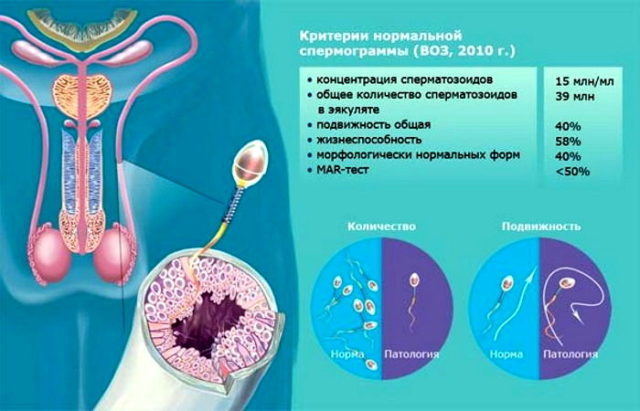Symptoms of pyelonephritis in children: what to look for
Pyelonephritis in children seriously enough, but treatable disease. This disease accounts for early childhood, affecting the child's kidneys. In the early stages of the disease is manifested in the urinary system, causing either too frequent trips to the toilet, or too rare. If these symptoms are accompanied by fever, then parents should seek medical attention.
In children up to 5 years, pyelonephritis symptoms are quite common, it is the most dangerous age for this disease.
We strongly recommend not to fight this disease in the home, when the first symptoms, you should pay for qualified medical help. Below you'll learn how to identify pyelonephritis in children, it is worth to take in the first place, and what drugs can help in the early stages. When running the disease can cause serious complications such as severe renal abnormalities.
Causes of
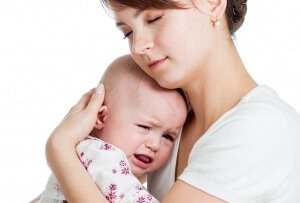 Pyelonephritis occur in people of any age from 6 months to age. But still most often it occurs in young children. This is due to the fact that in their urine are not yet available antimicrobial agents, and the anatomy of the child's urinary system is somewhat different from the adult.
Pyelonephritis occur in people of any age from 6 months to age. But still most often it occurs in young children. This is due to the fact that in their urine are not yet available antimicrobial agents, and the anatomy of the child's urinary system is somewhat different from the adult.
At an early age in girls is a disease occurs in 5 times more likely than boys due to the fact that their urethra constructed in a different way and bring back the infection is very easy, after which it rapidly moves up and reaches the kidney.
Inflammation of the kidneys caused by bacteria, the most common cause of getting E. coli. Furthermore it can provoke disease staphylococci, streptococci and enterococci.
In addition to bacterial inflammation caused by viruses, protozoa and fungi.
Microorganisms can enter the kidneys in several different ways:
- Hematogenous - blood from other organs, which is the site of infection. Particularly common way for babies who have pyelonephritis may occur after pneumonia or otitis media, and foci of infection can be even bodies located in a completely different body parts. In children, the older the infection can reach the renal system only with more severe disease.
- Urinogenny (or upward) - microbes that are in the area of the anus and the genitals, urethra and bladder, as if to climb up and get into the kidneys. This is the most common way of getting infections in girls, since due to the structural features of the urethra, the bacteria can easily get into it and climb up. That's why girls are more susceptible than boys.
- Lymphogenous path based on the contact infection in the kidneys of lymph system. Typically, renal lymph goes from the intestine, but when a malfunction, such as mucosal lesion bowel, lymph stagnation constipation, diarrhea, intestinal infections, kidneys may be infected with E. microflora.
Conditions and factors
Inflammation of the kidney provokes a certain pathogen, but also there are some conditions and factors conducive to the emergence of the disease.
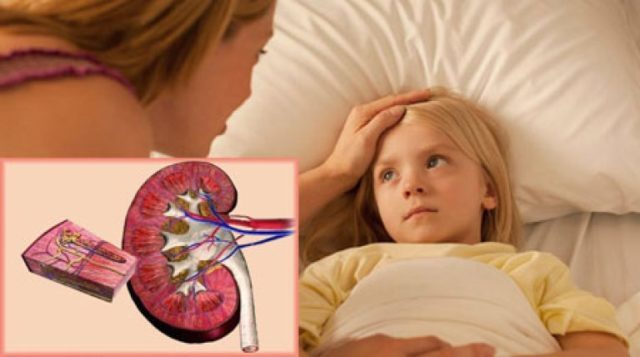
So, mostly pyelonephritis occurs under the following conditions:
- lowered immunity
- kidney and urinary tract, which interfere with the normal flow of urine
Contribute to the emergence of inflammation following factors: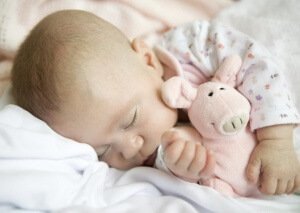
- severe hypothermia
- acute colds
- frequent sore throats
- scarlet fever
- diabetes
- intestinal dysbiosis
- teeth with caries, which can become a source of infection
- inability to completely empty the bladder during urination
- neglect of personal hygiene rules
- urolithiasis, where there are obstructions in the urinary tract
- vesicoureteral reflux - urine from the bladder flows back into the kidneys
- increase the burden on the immune system due to the transition from thoracic to artificial feeding, start complementary foods, as well as the first teeth
All these factors contribute to the occurrence of pyelonephritis in children when ingested pathogen.
forms of pyelonephritis
The primary form. The disease develops in initially healthy body with a normal anatomic structure and the absence of any abnormalities. That is, there are no anatomical factors and abnormalities usually provoke this disease. Pyelonephritis occurs in such form because of intestinal dysbiosis based on adverse conditions, such as frequent ARI or intestinal infection. Microbes get into the urethra, where urinogennym by penetrating into the bladder and kidneys.
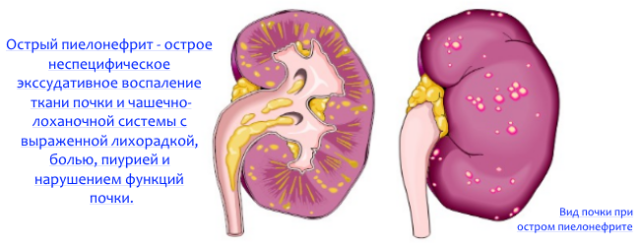
In children under 2 years are allocated the main forms of the disease:
Secondary form. In this case, the child is by nature prone to the emergence of this disease due to congenital anomalies of the structure of the urinary system. This may be irregularities in the structure or anatomical location of the kidneys themselves, as well as other organs of the system. All this hinders the normal outflow of urine, or by calling its stagnation, or throwing back into the kidneys already together with the bacteria that cause inflammation. It is also possible anomaly such as an underdeveloped kidneys, because of what their size is too small and functionality accordingly reduced. If at first it is not so much, from the growth of the child increases the load on the kidneys, and they are no longer cope with its task.
symptoms
Different children's symptoms vary greatly and depend on the severity of the disease, comorbidities and age of the child.
However, there are some common symptoms, which can suspect the presence of pyelonephritis:
- The elevated temperature. The child she rises to 38-39 ° C with no apparent reason. This is the main feature, which is often the only. The child no cough, no runny nose, and only severe fever and sweating.
- Lethargy, drowsiness and loss of appetite, nausea and regurgitation.
- Pale skin tone. The skin may be gray, and appears blue under the eyes. The ability to easily swelling of the face and eyelids.
- Sleep disturbance. The child becomes lethargic and sleepy during the day and night, restless and suffering from insomnia.
- Abdominal pain and lumbar region, worse when moving. Unfortunately, under the age of the child is still unable to report on their pain sensations, but by how troubled was the kid, the parent will immediately understand that it is something disturbing.
- Painful urination. It can also be defined by a restless child's behavior during urination - the child may groan, whine and even scream.
- urination disorder. Particularly alarming, if the baby is urinating in small portions. Also it can too often go "in a little" or, conversely, too rare despite the fact that consume water not less than usual. A normal amount of urination per night for babies up to six months - up to 20 times, from six months to a year - up to 15 times. The jet should be bright, continuous, and filled.
- The color of urine. Normal infant urine color - light yellow and transparent. When violations of the same, it becomes turbid and acquires a darker shade. If the color is pinkish-red, it indicates the presence of blood in urine cells. This occurs when lesions of the kidney, including and pyelonephritis. Urine may also purchase a sharp odor.
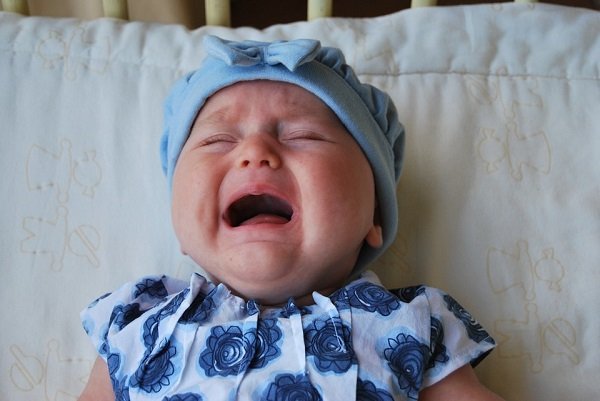
Children up to 1 year
Pyelonephritis in children under one year usually has the following symptoms:
- Increasing the temperature to 39-40 with no signs of airway inflammation
- Anxiety and sleep disturbance
- Decreased appetite
Raising the temperature to high numbers without any apparent reason should immediately alert both parents and doctors for the presence of the child pyelonephritis. Temperature pyelonephritis antipyretics poorly to treatment and several days is able to keep high figures.
Children from 1 year to 5 years
In children up to 5 years, along with a high fever appears abdominal pain without a specific localization, nausea and sometimes vomiting. Restless child can not clearly specify the place where it hurts.
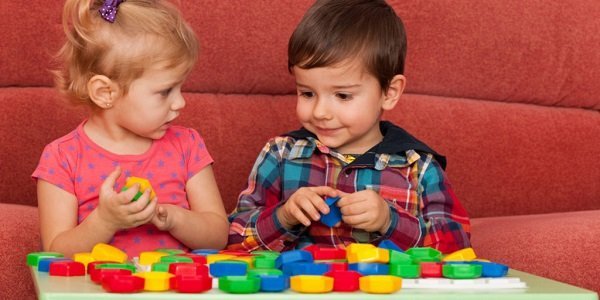
Over 5 years
Typical symptoms of the urinary organs appear only after 5-6 years of age, when the baby start to disturb aching pain in the lumbar and suprapubic tenderness and pain when urinating.
Thus, the "typical" set of symptoms of acute pyelonephritis in children older than 5 years includes the following:
- A sharp increase in body temperature to 39-40S. It is important to remember that the hallmark of inflammation of the kidneys from cold-related diseases is the lack of airway inflammation (runny nose, cough, sore and sore throat, pain in the ear). Temperature rises against a background of overall health right up to high levels.
- Symptoms of intoxication - child becomes lethargic, moody, refuses food. Bouts of chills alternate bouts of fever. Often the headache appears in the background temperature.
- Symptoms of the urinary system - usually on the second day after the temperature rise appears constant aching pain in the lumbar region (mostly all on one side), suprapubic pain, tenderness urinating. With the concomitant cystitis urge to urinate becomes frequent up to 20 or more times per day.
- Urine in pyelonephritis the child visually dark, cloudy, frothy, sometimes with a reddish tinge (due to the presence of blood in it).
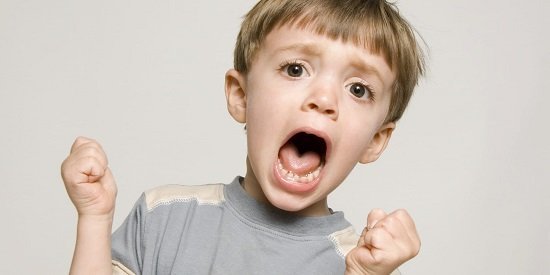
Despite the severity of the acute pyelonephritis, with timely treatment for the care and proper treatment, the disease has a favorable outcome. Often, however, an acute form becomes chronic.
Diagnostics
The survey begins at the pediatrician, and then assigned a consultation with a physician-nephrologist. Primarily the doctor finds out the history of the baby disease, whether colds, and whether there is any chronic illnesses.
Next, the doctor will ask the parent about the status of the child, his behavior, the existence of any complaints and warning signs. If your child has a fever for no reason in the absence of any symptoms, once there is a suspicion of pyelonephritis. A doctor examines a toddler necessarily to reveal the pale skin and the presence of edema.
The doctor makes palpation of the kidneys and watching at the same time the behavior of the child, to find out whether there is any pain in that area during palpation.
Further specialist will give a direction on analyzes. In order to make a diagnosis, it may be necessary to pass the following laboratory tests:
- general blood analysis
- blood chemistry
- general urine analysis
In addition to the analyst may impose the following studies:
- Ultrasound of the urinary system
- excretory urography - a radiopaque dye is injected intravenously and, depending on changes in the work of the kidneys revealed the presence of developmental abnormalities that were present at birth
- Radioisotope renografiya - of the kidneys, which in pyelonephritis show asymmetry organ damage
- CT scan
- kidney biopsy - the study of kidney tissue, but is assigned only in extreme cases, when an accurate diagnosis for any reason you can not.
Preparation for the analysis of urine
To diagnosed more accurately, it is necessary to carefully follow some rules: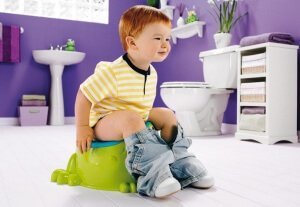
- eve not let the baby mineral water, so it may distort results of the analysis
- to collect the analysis buy in a pharmacy special container, wash it thoroughly with boiling water and drench
- collect material for analysis in the morning
- before that, wash your baby
- You do not need to substitute a jar at once, as the first urine is not very accurate, so going after the first couple of seconds of urination
If the overall analysis of the results are not satisfactory, and there is a deviation from the norm, it may appoint a study Nechiporenko. For suspected kidney failure or inflammation appoint analysis Zimnitskiy.
The analysis results will be available in 1-2 days. After examining them, the urologist will explain in detail the state of health of the baby, but this diagnosis is not completed.
Treatment
Treatment and necessary drugs can be prescribed only specialist. First of all restored the normal flow of urineIf it has been disturbed, can be installed catheter.
 Further treatment aimed at the destruction of the pathogen, which are assigned antibacterials. Antibiotics are prescribed for 3-4 weeks, tablets and the drug should be changed every 7-10 days to avoid in the body's resistance to antibiotics.
Further treatment aimed at the destruction of the pathogen, which are assigned antibacterials. Antibiotics are prescribed for 3-4 weeks, tablets and the drug should be changed every 7-10 days to avoid in the body's resistance to antibiotics.
After the pathogen detected is assigned a drug that is most effective in combating specifically with this pathogen. In severe cases, may appoint several antibiotics at once.
Other drugs aimed at the elimination of symptoms associated with the disease - it antipyretics, antispasmodics (if there is pain), drugs that improve blood circulation in the kidneys and vitamins. Possible hospitalization of the child, and this issue is resolved, depending on the condition of the child and severity of the disease. In inpatient treatment lasts about 2-4 weeks, but possibly more. More precisely about any forecasts and the timing of treatment can only tell the attending physician.
Pyelonephritis child is assigned to a special diet, aimed at reducing the burden on the kidneys.
Children under one year need to consume a high amount of water (up to 50% more age-appropriate daily requirement). You can only eat protein-vegetarian food and is recommended to avoid any irritating products.
See also:Is it possible to treat candidiasis in men folk remedies?
Due to improper treatment or a complete absence of any treatment, the disease will progress, flowing into more complex forms, causing the following effects:
- the occurrence of ulcers in the affected organ, the accumulation of pus in the kidney (abscess), purulent inflammation and blood poisoning
- chronic renal failure, which can lead to death.
FEATURES OF TREATMENT IN CHILDREN
Depending on the disease, is assigned to a particular course of treatment. With regard to the acute form of pyelonephritis, it requires treatment in a hospital. Due to this the child is under the constant supervision of doctors. Therapy is prescribed such medicines:
- Treatment with antibiotics. These medicines contribute to suppression of inflammation. Dr. Komorowski, who is a renowned expert in the field of pediatrics, focuses on the fact that in addition to antibiotics, no tool can not remove the cause of the development of pyelonephritis.
- Diet for children. It should be excluded from the diet of fried, fatty, spicy and smoked food. After all, they have an irritating effect on the kidneys, which slows the healing process.
- Drinking plenty of fluids. Liquid promotes the excretion of harmful substances.
In-patient treatment takes about 2 weeks. After receiving antibiotics child appointed antibacterial and antiseptic agents.
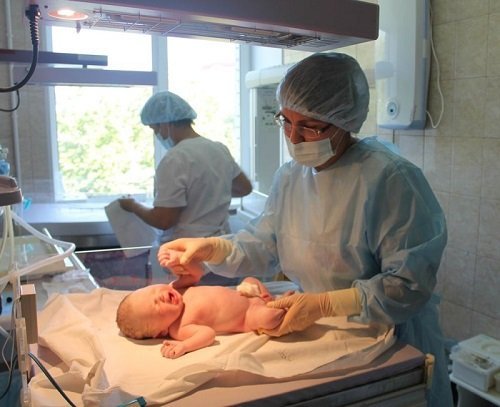
The chronic form of the disease involves periodic antibiotics to eliminate the possible aggravation of pyelonephritis. Also diuretics are used for prevention. It is possible to turn to traditional medicines that are easy to cope with this task.
Important to remember! Treatment should be terminated only after the positive results of a urine test! Otherwise pyelonephritis may lead to dangerous consequences.
Treatment of folk remedies
Traditional medicine provides treatment for pyelonephritis herbs. There are a variety of herbs that have a beneficial effect on the functioning of kidneys and contribute to the elimination of the disease. The advantage of this effect on the disease is a complete absence of contraindications to the medicinal herbs. The only limitation - idiosyncrasy of a particular plant.
The most effective diuretic herbs from which you want to prepare decoctions:
- cranberries;
- corn silk;
- aspen leaves;
- bearberry;
- flax seeds;
- elder.
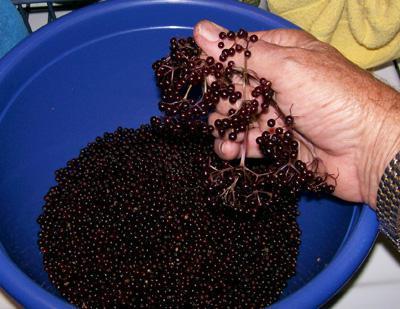
Decoctions of these plants should be consumed 1 glass 3 times a day.
Important to remember! Before using certain traditional medicines requires expert advice! He will tell you how to take them home. This is especially true for children suffering from a chronic form of the disease.
operative intervention
Operation during pyelonephritis shown in two cases:
- autopsy abscess or carbuncle kidney, which developed as a complication of acute pyelonephritis
- in order to improve the flow of urine are carried out: the plastic ureters or urethra, removing stones.
Food
Diet with acute pyelonephritis is the removal of salt, fatty, fried, spicy food. A person should drink more than 2 liters of fluid (desirable fruit drinks, fruit drinks, herbal teas), limit the use of animal protein.
In the chronic form of the disease the power as follows:
- exclude meat, mushroom and fish broth
- meat and fish - only boiled, lean
- salt - at least 8 grams per day
- the basis of the diet - fruits, vegetables and juices.
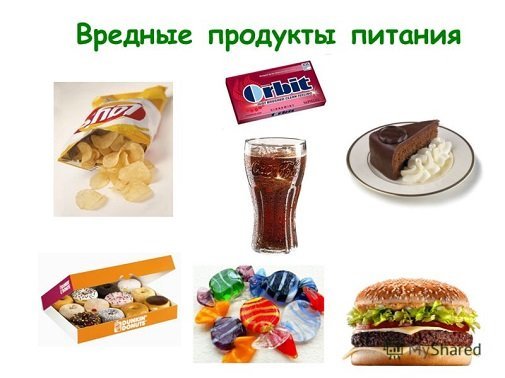
methods healers
Folk remedies in this disease - it is:
- fruit drinks and fruit drinks cranberry or cranberry
- decoction of birch buds
- decoction of thyme
- decoction of corn stigmas (1 teaspoon per 200 ml water)
- bearberry broth
- decoction of chamomile flowers.
Tip: Before applying any national agents need to consult with your doctor, so as not to harm the baby.
Physiotherapy
LFK shown in period stihanija manifestations pyelonephritis (after normalization of temperature and relief of pain).
Apply these types of gymnastics:
- gymnastics
- outdoor games
- Walking various kinds: in the water, up the stairs, cross-country skiing
- breathing exercises.
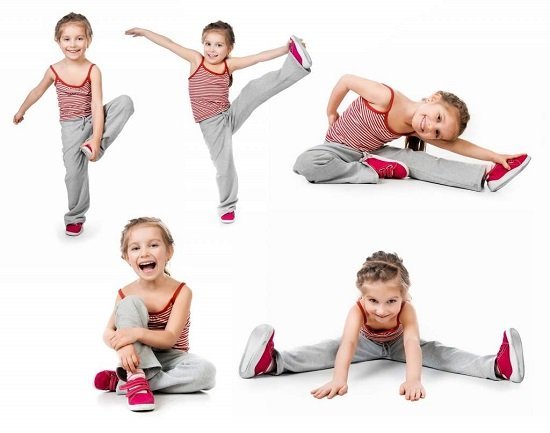
Massage
In chronic pyelonephritis massage shown to improve renal circulation. Massaging need neck, waist, back, buttocks, abdomen, lower limbs. Using such techniques as effleurage in these areas. Course - 20 procedures.
Tip: The massages should be made by a licensed massage therapist. They should not cause pain, after which the child is not urinating blood.
How to prevent the development of
Prevention of the disease is that parents should ensure that:
- child drinking enough fluids
- patient to empty the bladder, as little as possible and briefly
- daily recovering
- time went to treat caries, tonsillitis, sinusitis
- conducted adequate hygiene of the genitals and the anus (in infants often need to change a diaper)
- I follow the rules of a balanced diet.
Also, in order to prevent pyelonephritis is important to pass ultrasound in the first year, every six months to take the urinalysis.
Pyelonephritis in children and adolescents - a fairly common pathology, arising under the influence of microbial causes. In children, the first few years of life, symptoms of this disease are non-specific, making it difficult to diagnose, but with age they are the same as in adults. diagnosis itself is easy to install. Treatment is usually conservative, it is carried out for a long time. There are also cases when surgery without pyelonephritis not cure.
doktordetok.ru/urolog/pielonefrit-u-detey-simptomy-lechenie.html
Pyelonephritis in Pregnancy
The disease occurs during pregnancy is hard enough. In order to avoid the influence on the future of the child, should adhere to these rules:
- control specialist sensitivity to antibiotics;
- organism enrichment with vitamins during treatment;
- proper rest;
- drinking plenty of fluids.
It's important to know! Pregnant women should be treated in a hospital! This will help to monitor the status of the expectant mother.
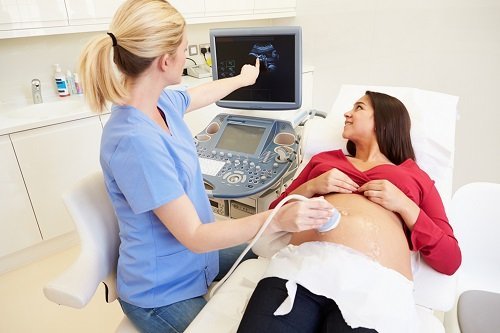
detki-zdorovy.ru/bolezni-detey/bolezni-mochevoj-sistemy/pielonefrit/
prevention
To protect your baby from this disease, you just need to follow these rules:
- Regularly change diapers and be sure to wear them to walk and sleep, since the longer the sexual organs of the child in contact with the release, the higher the risk of ingress of infection.
- Follow frequency of urination, as long being in fluid bladder promotes accumulation of bacteria.
- Carefully observe the rules of hygiene and regularly wash away the child. The girl can only undermine movements from front to back. Change your underwear baby. If the vulva redness, make a bath of decoction of chamomile or calendula.
- Drink baby should only cleaned, boiled water. Acquiring mineral water, give preference to the dining room. If a child is ill with pyelonephritis time, he will be assigned to a special diet.
Pyelonephritis - is one common childhood illnesses, and children aged up to one year subject to him no less than the other age groups. It is important to carefully monitor the condition of the baby, and at the first warning signs to see a doctor, to early treatment and avoid complications and unfortunate consequences.
diagnozlab.com/analysis/infectious/pielonefrit-u-detej-do-goda.html
etiological aspects
The main reason of pyelonephritis - the penetration of infection in the kidney. Pathogens (Escherichia coli, Enterococcus, Staphylococcus, Proteus and others) could hardly be identified, for a long time is in the interstitial tissue of the organ. Gradually, in the event of favorable conditions for bacteria develops, begins the acute phase of pyelonephritis. No treatment or long-term treatment, not bringing results, it develops into a chronic form, which can be cropped, but can not be cured completely.
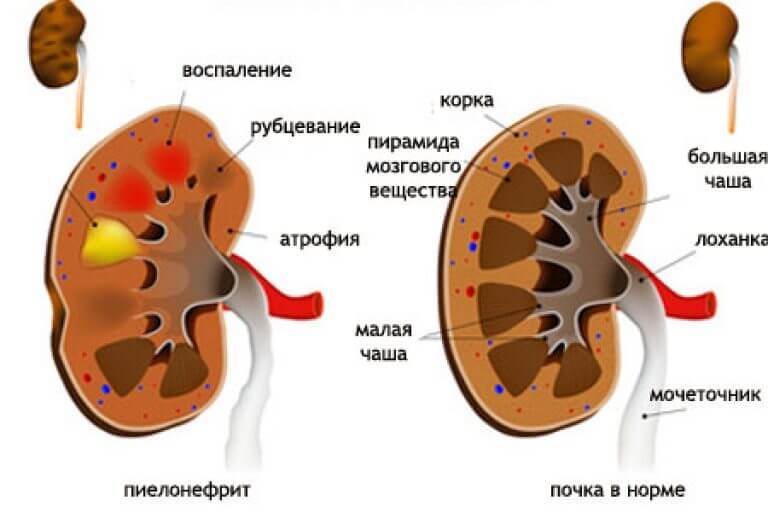
Etiology emergence initially involves the following possible reasons:
- The chronic nature of the disease, which are provocateurs kidney infection - diabetes, tonsillitis, gastrointestinal pathology. Such diseases lead to a reduction of human immune functions.
- Irregularities in the urinary system that has not been diagnosed in time - urolithiasis, adenoma, nephroptosis.
- Prolonged acute pyelonephritis which can not be effectively treated, leads to a chronic course and progression of the disease.
Female exposed to this disease more often due to shorter urethra. Pregnancy and subsequent generic process also become a cause pyelonephritis.
FINDINGS
The disease is divided into three stages, depending on what kind of companion laboratory signs predominate:
- In the first step in the analysis of urine leukocytes tend to increase. Interstitial tissue is affected and there is atrophy of the tubules.
- The second stage is characterized by the compression of the tubules and loss of nephrons. It occurs scarring and tissue necrosis.
- The third stage begins chronic pyelonephritis active replacement organ connective tissue cells, which are not able to function. Kidney, in this context, becomes smaller, wrinkled, and the surface becomes loose with tubercles.
The analysis of the observed decrease in hemoglobin and blood biochemistry in terms of increased creatinine and urea.
Symptoms Depending on the phase ACTIVITY
Symptoms of pyelonephritis largely depend on the co-morbidities, the location of infectious microbes, and on which phase of the activity observed in the current moment?
1. The latent period is characterized by the lack of pronounced symptoms. Clinical condition manifests itself:
- general weakness;
- high fatigue;
- decreased appetite;
- possible headaches.
Operation of the renal urine concentration manifests itself in polyuria and gipostenurii.
2. Recurrent pyelonephritis due to the shape of the flow jumps to the manifestation of symptoms. Periods of active symptoms are replaced by decaying processes and easing pain, which can be expressed:
- state of fever: high fever, weakness;
- pain in the lumbar area and a feeling of heaviness;
- disorders of the urinary system.
If there is a recurring form of the typical picture of an exacerbation of acute pyelonephritis.
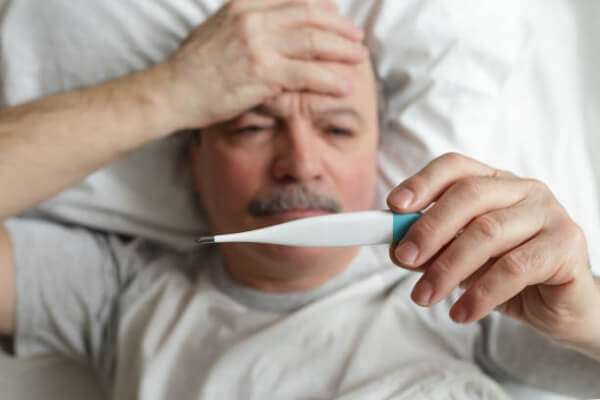
3. Hypertensive phase is caused by hypertensive syndrome with absence of pain during urination:
- dizziness;
- headaches;
- insomnia;
- dyspnea;
- heart failure;
- hypertensive crisis.
4. Anemic form of pyelonephritis develops under the influence of hypochromic anemia, arrhythmia is not expressed clearly, and urinary symptoms are extremely poor.
5. Azotemicheskuyu phase is characterized by symptoms of chronic renal failure.
The appearance of the patient is also subject to change. Facial swelling appear, especially around the eyes, the skin becomes pale.
Acute pyelonephritis in infants
Grudnichok can not complain of back pain, muscle or head, but parents can be noted:
- heat
- pale gray skin color
- posseting
- refusal to eat while breastfeeding
- diarrhea
- lethargy
- may be convulsions.
Acute pyelonephritis in preschoolers
If the child is 1 year still can not present any complaints, and pyelonephritis may be suspected by careful examination, then 2 years and older is changing. Further temperature increase, vomiting and inappetence child indicates abdominal pain, often in the region of the umbilicus having moderate. This gives pain in the thigh, the suprapubic area, perineum. Also, the child may complain of painful urination, and parents notice an unpleasant smell of urine.
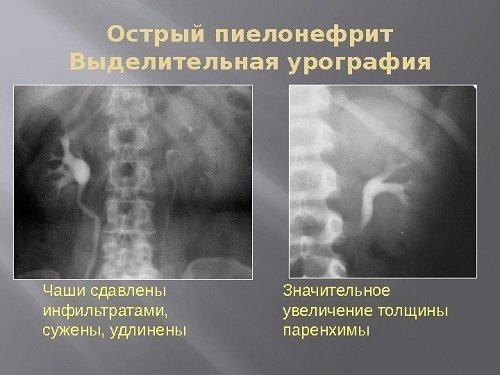
Acute inflammation in schoolchildren and adolescents
Pathology Diagnosis is based on the complaints of the child:
- pain in the side or back
- high temperature, which is recorded for more than 2 days
- chills
- determination of blood in the urine
- painful urination and frequent.
Symptoms of chronic pyelonephritis
This disease usually develops in young children after the age of 1 year or earlier observed symptoms of acute inflammation of the kidneys.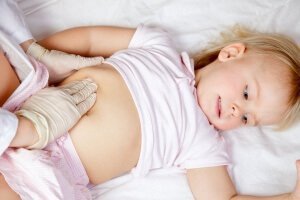
On a chronic inflammatory disease of renal pelvis and cups indicate:
- unexpressed pain
- feeling freezing waist
- occasionally - a strange urge to urinate (weak or, on the contrary, mandatory)
- growth retardation
- insufficient weight gain during breast or bottle-fed
- pale skin.
Sometimes only carefully described the history of the disease can help the pediatrician suspected chronic type of inflammation.
complications
Each recurrence of pyelonephritis inflammation affects a growing number of kidney tissue, replacing it with the connecting cells. Kidney parenchyma is gradually becoming incapacitated, the operation is not fully possible.
If double-sided pyelonephritis, an infection in a relatively short period of time leads to chronic renal failure, which requires dialysis - cleaning the blood of toxins by means of a special device "Artificial kidney".
Pyelonephritis can cause the following complications:
- Paranephritis - the formation of purulent foci in the perinephric tissue.
- Necrotizing papillitis character is diagnosed more often in women. This complication is caused by patients with urological pathologies.
- Urosepsis - a contagious infection of the kidneys flows to adjacent organs. The process is very dangerous for the whole organism.
- Acute and chronic renal failure, the kidneys can not be specified to generate urine and unhindered its output.
See also:Stem hypospadias shape and particularly its treatment
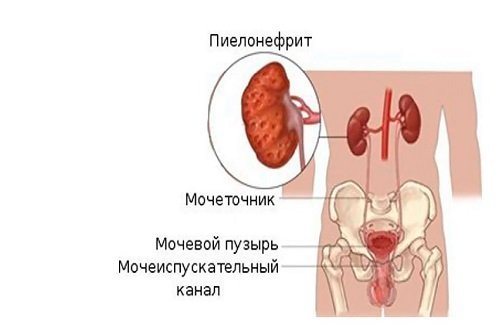
Forms of development of the child
Pediatrics highlights the two main forms of chronic pyelonephritis in children:
- Primary form - initial infection and the development is carried out directly in the kidney.
- Secondary - an inflammatory process occurs as a result of other pathologies.
Chronic course of the disease in childhood due to severe symptoms of urinary system for six months or more. Thus pyelonephritis exacerbation of the period occurs at least 2 times with overflowing from latent forms an acute.
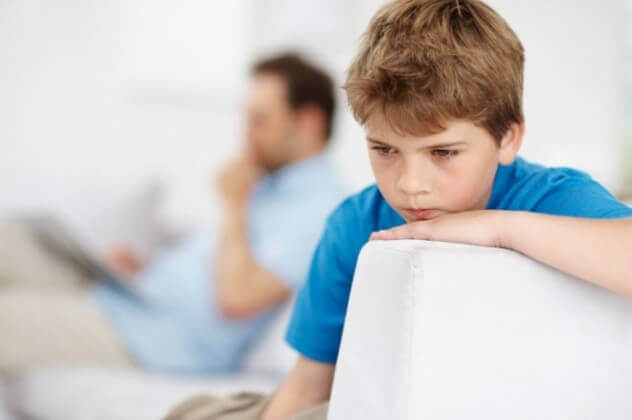
A relapse of the inflammatory process in children is characterized by the following symptoms:
- At the initial stage of the disease state manifested influenza: chills, sweating, weakness. In infants, reduced body weight and diarrhea observed.
- Pain in urination strong enough.
- The urge to empty the bladder occur with great frequency. The child feels anxiety, pain and stinging. Often pyelonephritis is accompanied by incontinence.
- Pasternatskogo positive syndrome (lumbar pain, aggravated by effleurage).
Pyelonephritis, which began at an early age, gets its development in the form of complications such as hydronephrosis, nephrosclerosis, hypertension. Without purposeful competent treatment from a nephrologist is a risk of chronic renal failure.
diagnostic measures
diagnosis difficulty is that during the latent stage of pyelonephritis not always possible to identify the disease. Only the acute period will give accurate answers after laboratory tests:
- blood tests (general and biochemical), in which at pyelonephritis signs will indicate leukocyturia neutrophilic nature, at least - eritrotsiturii;
- urinalysis will crystalluria, increased levels of oxalates, phosphates and urates. Urine is not concentrated, turbid, with reduced ability to dissolve salts;
- Nechyporenko assay detects active leukocytes which significantly exceed the erythrocytes;
- Zimnitsky assay determines the concentration of daily urine standards.
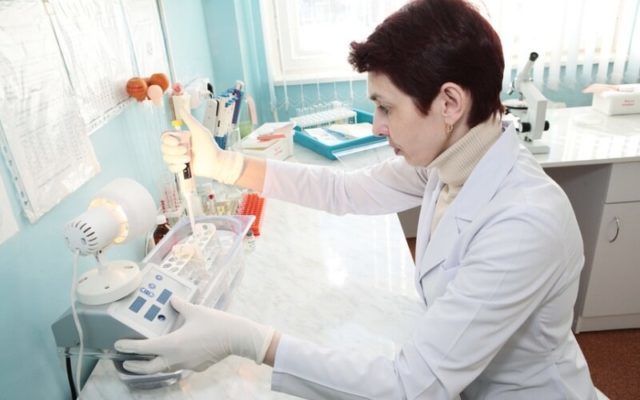
Further examination of the kidneys are assigned via instrumental diagnostics:
- radiological scoping study or contrast - give kidney pictures with precise localization of the infected area;
- cystochromoscopy - indicate a malfunction of the urinary organ function;
- Retrograde pyelography allow to consider deformation pyelocaliceal area;
- ultrasonography detects not symmetrical arrangement, and kidney damage tissue structure.
Computer and magnetic-resonance therapy can show a clear and informative picture of infectious kidney damage. At insufficiency of damage data used for the diagnosis of a biopsy, which can also give a negative result due to the analysis of a healthy piece of fabric.
A COURSE OF TREATMENT
Chronic pyelonephritis involves a comprehensive treatment approach that includes not only medication, but also drinking regime and a specific diet.
General recommendations:
- Antibiotic therapy - medication (penicillin, cephalosporins, aminoglycosides, etc.), taking into account the infection that caused the pathology. Duration of the course is about a month, and the antibiotic change occurs every 7 or 10 days. In the absence of the drug should change the positive response of the patient to the drug, after 2-3 days.
- The use of diuretics to enhance blood circulation in the kidney tissues and removing the edematous responses.
- A course on the immune adjusting a patient's body.
- Treatment aimed at reduction of possible recurrence, taking anti-inflammatory drugs in small doses.
- Therapy herbs (St. John's wort, rosehips, bearberry, nettle, camomile) is required in the aspect of treatment of pyelonephritis.
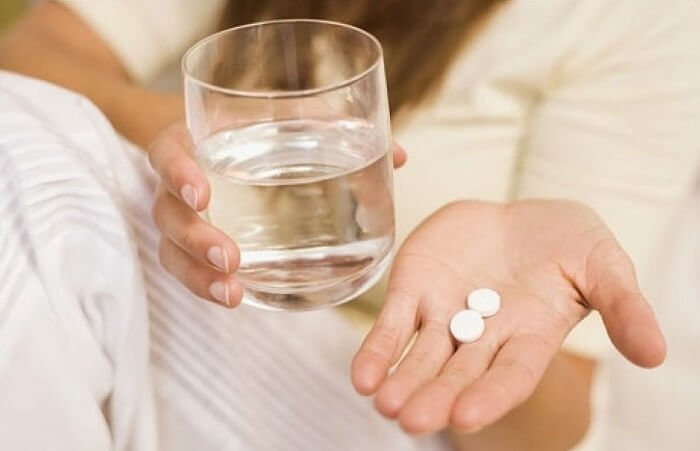
Healthy lifestyle and diet recommended by your doctor - make up the healing process. Diet excludes reception salty and spicy dishes. It is acceptable to enrich the diet of dairy and plant foods.
disease prevention
The main feature of the prevention of chronic pyelonephritis is the control of the patient's dynamic performance. For this man put on dispensary registration in a health facility. To prevent recurrent processes should strictly avoid hypothermia and follow the normal outflow of urine, to avoid obstacles on its removal.
Long walks in the fresh air, moderate exercise and a healthy lifestyle can minimize the possibility of recurrence. Spa treatment spa orientation reduces the risk of relapse.
beregipochki.ru/bolezni-pochek/pielonefrit/xronicheskaya-forma.html
Basic principles of treatment
It is important to understand that the treatment of any disease, especially so serious as pyelonephritis, not limited to drugs. Treatment - a wide range of measures aimed not only at eliminating the causes of the disease, but preventing subsequent relapse (relapse).
The treatment of any inflammatory kidney disease complex consists of the following components:
- Mode
- Diet
- drug therapy
- Physical therapy and exercise therapy
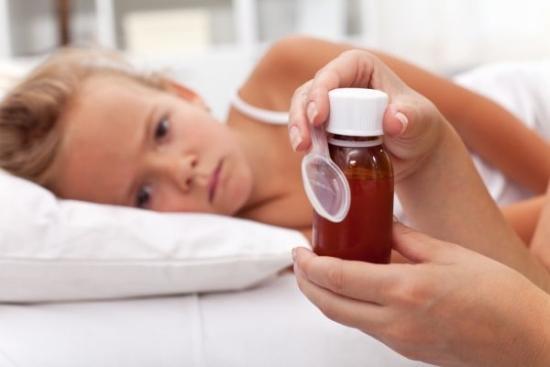
Always need to clearly observe all the advice of a doctor for a speedy recovery and relapse prevention.
Mode
Between expressed manifestations of the disease or polupostelny recommended bed mode. About studying, walks and, especially, sports training you need to forget. In the second week of the disease, when the temperature drops significantly and runs back pain, it is possible to expand the regime, however, will be much better if the entire period of the disease the child will hold the house.
dieting
Diet for pyelonephritis in children as well as adults - an essential attribute of a successful recovery.
- From the child's diet be sure to eliminate the sharp, salty, fried foods, limit foods high in protein.
- 7-10 day course of acute forms must go on a diet with lactic incomplete restriction of salt and protein.
- Also recommended excessive drinking (fruit drinks, fruit drinks, weak tea), and in chronic pyelonephritis (during periods of remission) Obligatory alkalescent drinking mineral water.
drug therapy
a) Antibiotics
All inflammatory diseases are treated with special anti-microbial drugs (antibiotics), pyelonephritis and children - is no exception. However, in no case be engaged in self-treatment of a child - only a doctor makes use of antibiotics (!) which is able to take into account all the selection criteria of the drug, based on the severity of the disease, age and individual peculiarities child. Treatment of acute and chronic treatment of pyelonephritis in children is conducted on the same principles.
Antibiotics for pyelonephritis in children presents a relatively small range, as many Antibiotics are contraindicated to 12 or 18 years, so experts usually prescribe the following groups preparations: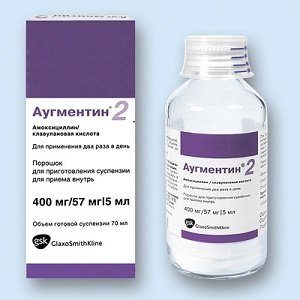
- Protected penicillins (Augmentin, Amoksiklav). In addition to conventional tablets, the antibiotics are produced in the form of sweet suspension for younger children and the dosage carried by a special measuring syringe or spoon.
- Cephalosporin antibiotics group, which most often only by injection, so it is used for patient treatment (cefotaxime, Tsefuroksin, Ceftriaxone). However, some also exist in the form of suspension, capsules, soluble tablets (Tsedeks, Supraks).
- Aminoglycosides (Sumamed, Gentamicin) and carbapenems, in rare cases, also have a place to be, but more often they are used as an alternative and as part of combination therapy.
In severe the doctor may several antibiotics from different groups (combination therapy), as soon as possible to get rid of the infectious agent. Sometimes one antibiotic has to be replaced by another, and this occurs in the following cases:
- If after 2-3 days the condition did not improve after taking the drug or, conversely, has deteriorated, and the temperature continues to stay on the previous figures
- With prolonged treatment for more than 10-14 days. In this case, the doctor must replace antibiotics to prevent the development of the child's body's addiction to the drug.
b) uroseptikov
Drug therapy is not limited to antibiotics - there are other important group of drugs, e.g., uroantiseptiki (nalidixic acid). They are appointed after a course of antibiotics for children older than 2 years.
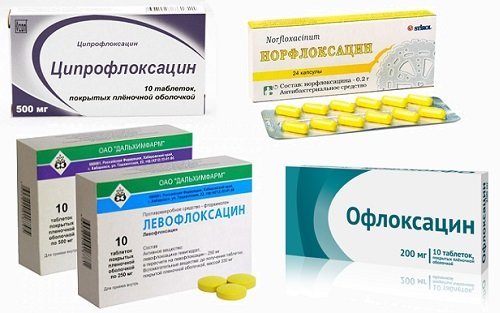
c) Vitamins and immunomodulators
Completed a basic treatment, be sure to restore the weakened immune system from illness. For this purpose usually prescribed imunnomodulyatory (viferon, reaferon) and multivitamin complex according to the age of the child.
g) Treatment herbs
Phytotherapy renal diseases have long proved effective, however, it may be carried out only in combination with basic drugs.
Well established:
- bear ears,
- bearberry,
- Birch buds,
- horsetail.
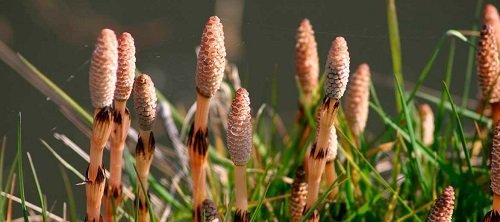
These plants have anti-inflammatory and antiseptic effect, but they need to take a long course.
Features in-patient treatment
- Treatment of pyelonephritis in children only (!) is held up to a year in hospital under close medical supervision.
- Older children with average or severe as necessarily hospitalized.
- Treatment of acute pyelonephritis in children older than 10 years, it is desirable to always be carried out in a hospital (even in mild severity) to spend time and complex diagnostic procedures to identify the cause disease.
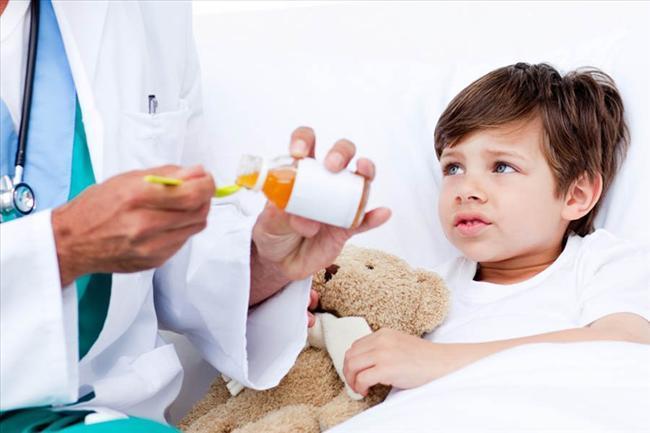
Nursing care in pyelonephritis in children includes activities to monitor compliance in the period of fever (especially important for children 3-10 years old) monitoring compliance with diet, timely care, and other activities that enable the creation of comfortable conditions for a speedy recovery child.
choice of treatment is often carried out together with the pediatric surgeon-urologist to timely address the issue of elimination of anatomical abnormalities, if diagnosed secondary acute or secondary chronic pyelonephritis children.
Physiotherapy
Physical therapy depends on severity of the disease, and often appointed a physiotherapist after a course of primary treatment when the child is normalized.
Well established:
- ultrasonic methods
- UHF-therapy,
- magnet.
Also at calming the inflammatory process shown therapeutic exercise in the supine position or sitting, depending on the age and condition of the child.
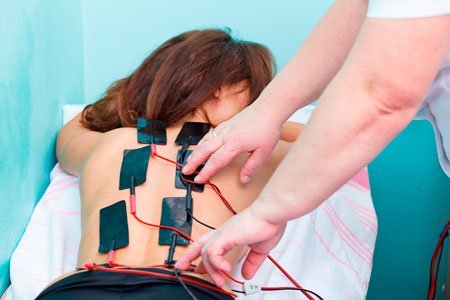
Required actions
Prophylaxis of pyelonephritis in children plays an important role both in the acute and chronic form of the disease. It is divided into primary and secondary.
Primary prevention (prevention of disease) comprises a timely removal of foci of chronic infections (carious teeth, chronic otitis media and tonsillitis), strengthening the immune system and avoidance of hypothermia, personal hygiene (especially careful hygiene external genital authorities).
Secondary implies a prevention of exacerbations and includes a doctor's recommendation: compliance preventive treatment, systematic observation, as well as all of the above events the primary prevention.
dynamic observation
Both acute and chronic pyelonephritis in children suggest dynamic observation in the pediatric urologist, nephrologist or pediatrician with periodic urinalysis and renal ultrasound:
- - After an acute episode or exacerbation of chronic - 1 time in 10 days
- - In the period of remission - 1 time per month
- - In the first 3 years after treatment - 1 time in 3 months
- - Up to 15 years - 1 or 2 times a year
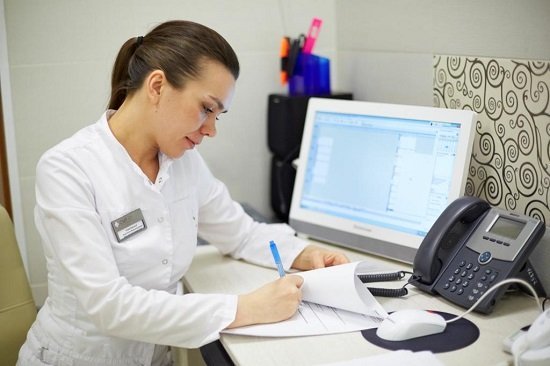
Systematic observation to avoid long-term complications of the disease: chronic renal failure, hypertension, urolithiasis.
The chronic form
- Chronic pyelonephritis find flowing more than 1 year and having 2 or more acute episodes during this period.
- This form is an alternation of recurrent exacerbations (particularly in the spring and autumn period) and asymptomatic periods.
- chronic forms of expression are the same as in acute, but often less marked.
- For chronic pyelonephritis slow and long.
With frequent exacerbations wrong treatment and prevention of disease absence can lead to such serious complications as renal failure.
The complex of diagnostic measures
Experienced doctors diagnose "Pyelonephritis" is not difficult, especially if in the history of the disease have been episodes of the disease. Usually, diagnosis of pyelonephritis in children be sure to include:
- general urine analysis,
- general blood analysis,
- urine culture on the flora,
- Renal ultrasound.
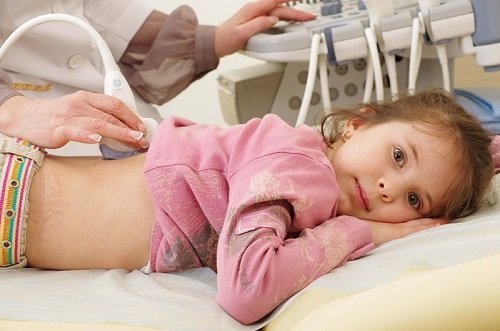
In the presence of bacteria in urine and leukocytes, and at an appropriate ultrasonic picture physician may already deliver the appropriate diagnosis.
xn - jtbaaladvu8alb1cw.xn - p1ai / oslozhneniya-tsistita / pielonefrit-u-detej.html
Causes of pyelonephritis
Pyelonephritis is always caused by microorganisms. The main causative agent of disease in young patients is E. coli. Stimulate emergence of disease may different viruses, Staphylococcus aureus, fungi and protozoa. In chronic diseases flowing from research often reveals just some of its originators.
The child's kidneys dangerous microorganisms penetrate:
- Of sexual organs and excretory system. Infection is able to rise from the urethra, anus or urinary tract. This way of infection is particularly common in girls
- Of bone and various organs. In this way microorganisms often penetrate into neonatal kidney recently undergone otitis, pneumonia and other infectious diseases
- Through the lymphatic system. kidney infection possibly due to intoxication
Factors contributing to the development of the disease
The development of the pathological condition is facilitated by such factors as:
- Problems with regular and complete outflow of urine on the background of urolithiasis
- Stagnation of urine dysfunction (including congenital) of the bladder
- Diabetes
- Diseases that reduce the body's natural defenses
- Sinusitis and tonsillitis
- Failure to observe personal hygiene and others.
See also:Faloprotezirovanie: strengths and weaknesses
In infants, the pathology is often a failure of breastfeeding, during inflammatory processes teething and other factors which increase the load on the still unformed through and fragile immunity.
types of diseases
Depending on predisposing factors isolated 2 basic types of the disease:
- primary. Such abnormality occurs in the absence of co-factors expressed by
- secondary. The disease develops in the presence of structural abnormalities in the urinary organs and functional disorders
Depending on the nature of the flow are the following diseases:
- acute. For such pyelonephritis characterized by high fever and other symptoms of acute inflammation
- chronic. For such pyelonephritis is characterized by frequent relapses, but cases are diagnosed and latentogo flow when the patient does not experience the symptoms of disease, and the changes are found only in laboratory studies. In the chronic form of the disease may accompany all human life
Characteristics of the disease in patients from birth and up to 1-1.5 years

Neonates pyelonephritis occurs with signs of intoxication, which are expressed in:
- High (up to 40 degrees) temperature
- convulsions
- Pallor and blueness of the skin
- Weight reduction
- Refusal to eat
- vomiting
- dehydration
Diarrhea may occur and cause urination difficulties.
In this case, newborns can not tell parents where they hurt. This aggravates the situation and delaying treatment. If you notice a child one or more symptoms of a pathological condition, should immediately make an appointment with your pediatrician. Specialist it is important to conduct a comprehensive diagnosis, which allows to quickly distinguish a kidney infection from the intestinal.
Symptoms of chronic pyelonephritis
Chronic pathology characterized by a special course. For the disease characterized by periods of remissions and exacerbations.
During remission children do not experience any symptoms of the disease. Even during the diagnosis the physician does not mark any important changes in laboratory parameters urinalysis (specific gravity, the content of leukocytes, protein, red blood cells, bacteria and cylinders).
For periods of exacerbations are characterized by the following symptoms:
- Pain in the back
- Abdominal discomfort
- Temperature increase
Also, parents often notice that the child is in chronic disease quickly gets tired, becomes irritable, restless. Schoolchildren often reduced attention and, consequently, performance. The child often distracted, can not focus, he complains of malaise. In some cases, there is a delay physical and mental development of the child.
diagnosis of the disease
The following studies are carried out for the diagnosis of the disease:
- General urine analysis. The main indicator of the pathological process is the dramatic increase in white blood cells. Indicators of red blood cells also increased in the urine detected bacteria and other impurities
- Cumulative urine sample. They also indicate the presence of infection increasing performance of white blood cells
- Seeding for sterility. This study is conducted to determine the cause of pathology (particular microorganism)
- General blood analysis. On the development of infection indicates increased rates of white blood cells. Thanks to a blood test can detect and anemia
- Blood chemistry. Diagnostics to determine protein levels decrease, increasing rates of urea and creatinine
To clarify the diagnosis carried out studies such as:
- Ultrasound of the urinary system
- radiographic examination
- Doppler blood flow in the kidney
- CT, MRI, etc..
This diagnosis aims to identify anatomical abnormalities can detect the cause of the pathology and to determine how to resolve it.
Treatment
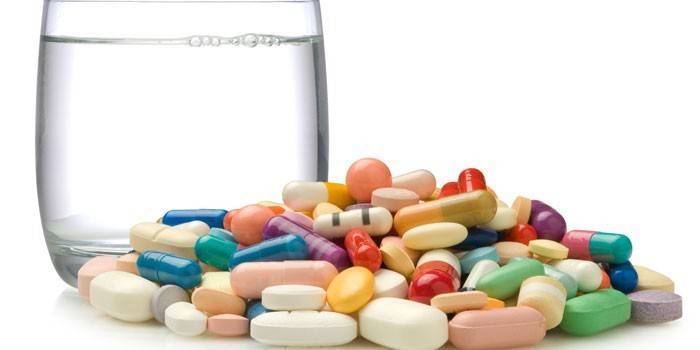
Determine pyelonephritis in children (symptoms) and the treatment of conduct should be as soon as possible. The therapy is carried out only in a hospital. As a rule, in the House of the child is 2-3 weeks. After this little patient is sent to outpatient treatment.
Inpatient therapy due to the need to:
- Careful selection of drugs
- Continuous evaluation of the dynamics of important laboratory parameters
- Intravenous and intramuscular administration of medical devices
The basis of treatment are:
- Alternative antibacterial therapy
- Protein and vegetable diet
- Limiting salt intake
- Drinking regime, approved by your doctor
- Receiving antispasmodics and other drugs for the treatment of pain, vitamin complexes to restore the body's defenses and anti-inflammatory drugs
Young patients should adhere to bed rest.
To which the doctor ask if you suspect the child has a problem?
If you notice a child's symptoms, should first consult your pediatrician. It is this initial examination the doctor will prescribe. If necessary, it will send a little patient to consult a urologist or nephrologist.
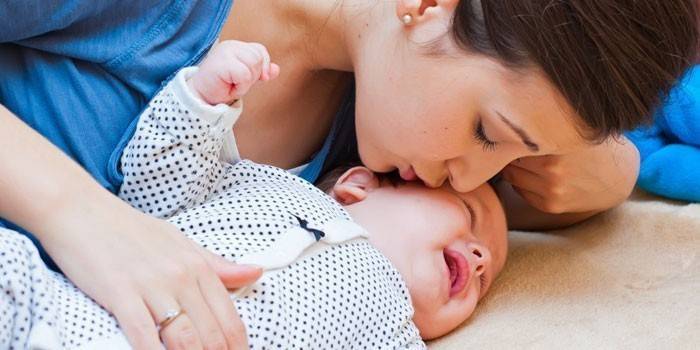
Patients with chronic pyelonephritis are always watching urologist or nephrologist. Usually children are registered to a specialist and observed constantly. Once every six months is mandatory surrender urine and blood samples, ultrasound is performed. This allows you to keep track of all the changes and monitor therapy. If necessary, advises parents infectious diseases.
Watch the little patient may professionals such as:
- immunologist
- endocrinologist
- Pulmonary and others.
This is due to the fact that the infection can develop not only in the kidneys but also other organs and whole body systems.
https://medsi.ru/articles/pielonefrit-u-detey-simptomy-i-lechenie/
symptoms of pyelonephritis
Pyelonephritis suspect a child may be in the following manifestations:
- "Causeless" fever. The child has a fever, the temperature rises to 38-40ºS, baby "burns." In this case, no other any obvious symptoms: cough and runny nose, sore throat is not red and does not hurt;
- delay and enuresis, frequent urination small portions. The child is not urinating for a long time or, conversely, too often asks the toilet;
- anxiety, pain during urination (usually at the end of the act);
- unpleasant odor of urine (in the diaper or in the pot);
- urine unusual clarity and color: muddy, mixed with blood, flakes, strands of mucus;
- abdominal pain, back;
- in infants may be developmental atsetonemicheskogo vomiting syndrome (acetone breath odor) and single loose stools.
diagnosis of pyelonephritis
Pyelonephritis is dangerous because inflammation can occur hidden in the urinary system, asymptomatic and detected "Accidentally", such as the planned urinalysis before vaccination or during the child's registration in kindergarten, school.
Pyelonephritis diagnosed with:
- laboratory diagnostics: Shall urinalysis, complete blood count, urine analysis according to Nechiporenko (collected only average stream of urine!) bakposev urine (this analysis is about 7 days and are not always informative!), biochemistry blood;
- Ultrasound of the urinary system - for the detection of congenital abnormalities of kidney, concretions, kidney purulent destruction (abscess, carbuncle, apostematoza, pyonephrosis). If the doctor suspected deviation from the kidneys and bladder, specialist further determines whether to send the additional examination is necessary or not;
- voiding cystography;
- excretory urography - is carried out according to indications, ultrasound changes.
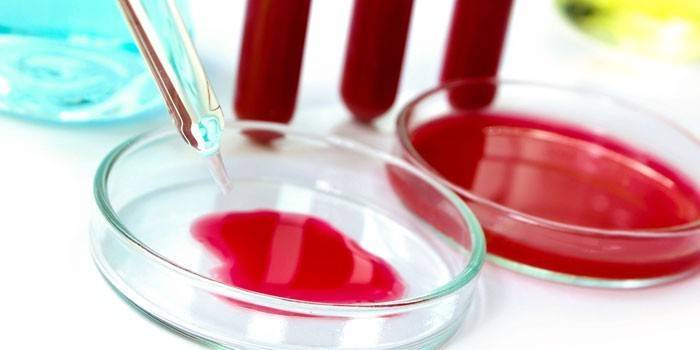
treatment of pyelonephritis
Pyelonephritis treated for a long time and individually. The main treatment - is antibiotics and uroseptiki. For the treatment of acute pyelonephritis usually take from three weeks to several months. Chronic pyelonephritis, with the development of renal failure can be treated for life with dialysis (artificial kidney device) or a kidney transplant. In the treatment of assigned diet:
- drinking plenty of fluids, juices are not recommended;
- prohibited spicy, greasy, salted, smoked, canned, ketchup, sauces, mayonnaise.
Acute pyelonephritis dangerous complications
If left untreated acute pyelonephritis or not recovered, this leads to the following complications:
- purulent destruction of kidney tissue (abscess, carbuncle, apostematoz, pyonephrosis), which subsequently requires surgical treatment, possibly even kidney removal;
- becomes chronic, with frequent relapses wrinkling kidneys, chronic renal failure, can be fatal.
Why so long treated pyelonephritis?
Launched inflammatory disease process in the kidneys lasts from three weeks up to 1.5 months. Usually, if a doctor prescribed antibiotics help, the child during the week is normalized: reduced to normal body temperature, the child not hurting urinate, improved appetite, become good blood and urine. However, do not hopes up for a speedy recovery. It is important to continue the treatment is started, because the inflammation is still smoldering, and if you stop the treatment, after some time, it repeated again and quickly go into a chronic form.
prophylaxis of pyelonephritis
To prevent the occurrence of disease, follow these guidelines:
- Ultrasound of the urinary tract in children aged 3 to 12 months for the detection of congenital malformations;
- urinalysis and CBC before routine vaccination;
- careful, correct, daily care of the external genitalia. Wash the genitals of the child need to customary detergent girls - from front to back, towards the rectum;
- timely detection and treatment of helminthic infestations (Enterobiasis);
- Timely, qualified treatment of any inflammatory disease, which can be a complication of pyelonephritis.
https://ru.tsn.ua/lady/dom_i_deti/deti/pielonefrit-u-detey-364051.html
What to do with pyelonephritis?
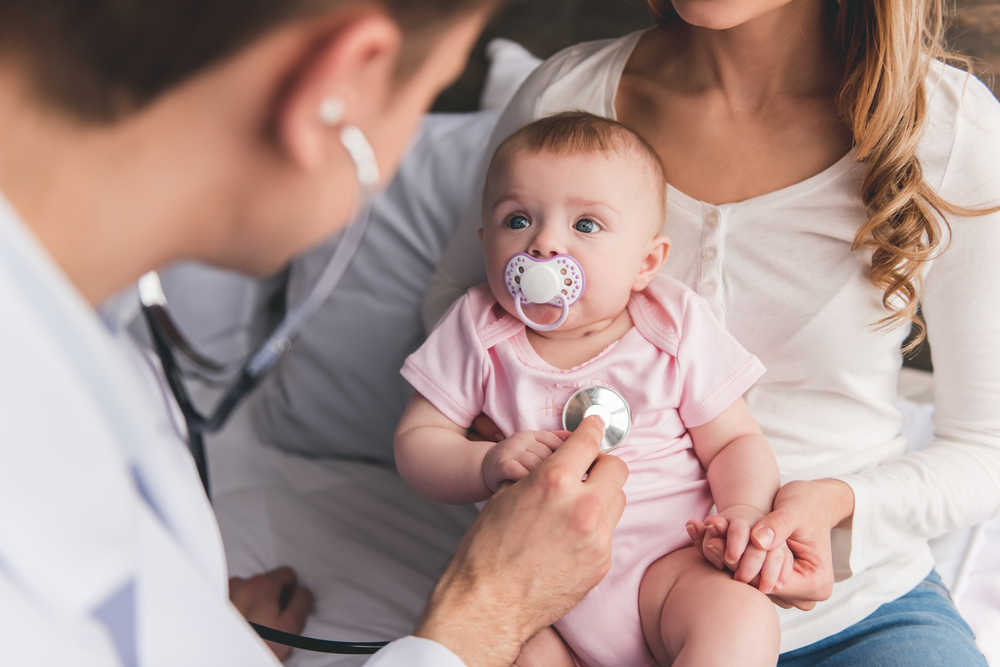
Of course, treat, and, unfortunately, antibiotics. There are no other options. Often children are hospitalized for treatment of pyelonephritis in the hospital. The doctor may prescribe the following drugs:
- Amoxicillin / klavupanat;
- Ampicillin / sulbactam;
- Cephalosporins II-IVpokoleniya;
- ampicillin;
- Co-trimoxazole.
Minimum course of antibiotic therapy is 7 days, then doctors are studying the results of analyzes of the child. Injections can be extended to 14 days. Treatment strategy should choose only a qualified technician. Self-medication is not permitted.
Also, throughout treatment and for several weeks after recovery to destination the doctor takes a little patient kanefron, furagin or FURAMAG. These drugs help prevent relapse. Parents also recommend drinking plenty ensure baby, carefully follow its hygiene and not to supercool.
The child's condition became much better already during the day after the first dose of antibiotics. The temperature drops, go soreness and discomfort. On the analysis of treatment reflected about on the third day, so that the success of these measures, doctors can judge on the fourth or fifth day after the start of treatment.
Within six months after the illness child should be seen by a specialist, nephrologist, pass urine every two weeks and observe the prescription of drinking regime. A year after the exacerbation of the doctors sent the baby to a urine test once every three months. Diet during remission demands to exclude from the diet of the baby all spices, canned and pickled products, and sausages. Endured the child pyelonephritis inter alia exempted from physical education classes in the main group for a year and transferred to the physical therapy group. Six months after the exacerbation, if possible, it is better to arrange treatment in a sanatorium crumbs.
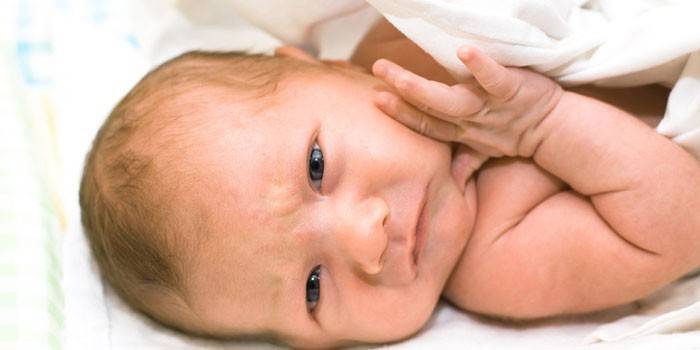
Also, parents of children who recover from these diseases, it is recommended to take the child's urine analysis for each suspected unwell child. Pyelonephritis often suffer only one or at most two times in my life, but it is possible that the kidneys may become a weak spot baby.
And do not forget about prevention!
Recommendations for the prevention of such diseases as pyelonephritis, reduced, first of all, to strengthen the overall immunity of the child and taking care of his health:
- Early learning of boys and girls basic self-care skills, the child's body careful observance of cleanliness.
- Drinking regime and healthy eating baby.
- Timely trips to the bathroom.
- on child tempering procedure.
- Compliance with sleep and waking the baby.
- Avoiding hypothermia child, drafts, cold flow of air conditioners and wear too light clothing.
Also worth as soon as possible to exclude all factors that can trigger inflammation of the kidneys. This will help to make:
- Immediate treatment of colds and viral diseases.
- Regular trips to the dentist and timely treatment of caries (patients teeth are also instigators pyelonephritis).
- Child treatment of chronic diseases.
Doctors agree that urine - the most capricious of all. Therefore, mothers and fathers need to learn exactly to collect the urine in the child correctly. Before collecting the kid need to undercut, take a sterile container, if necessary - to put on crumbs urinal - a special bag, which is attached to the crotch boys and girls - to labia. The accessory is on the child as long as he does not pee, and then easily removed. The contents poured into a jar. Deliver analysis to the laboratory must be one and a half hours after collection, but not later.
 https://www.proaist.ru/articles/pielonefrit-u-detey/
https://www.proaist.ru/articles/pielonefrit-u-detey/

